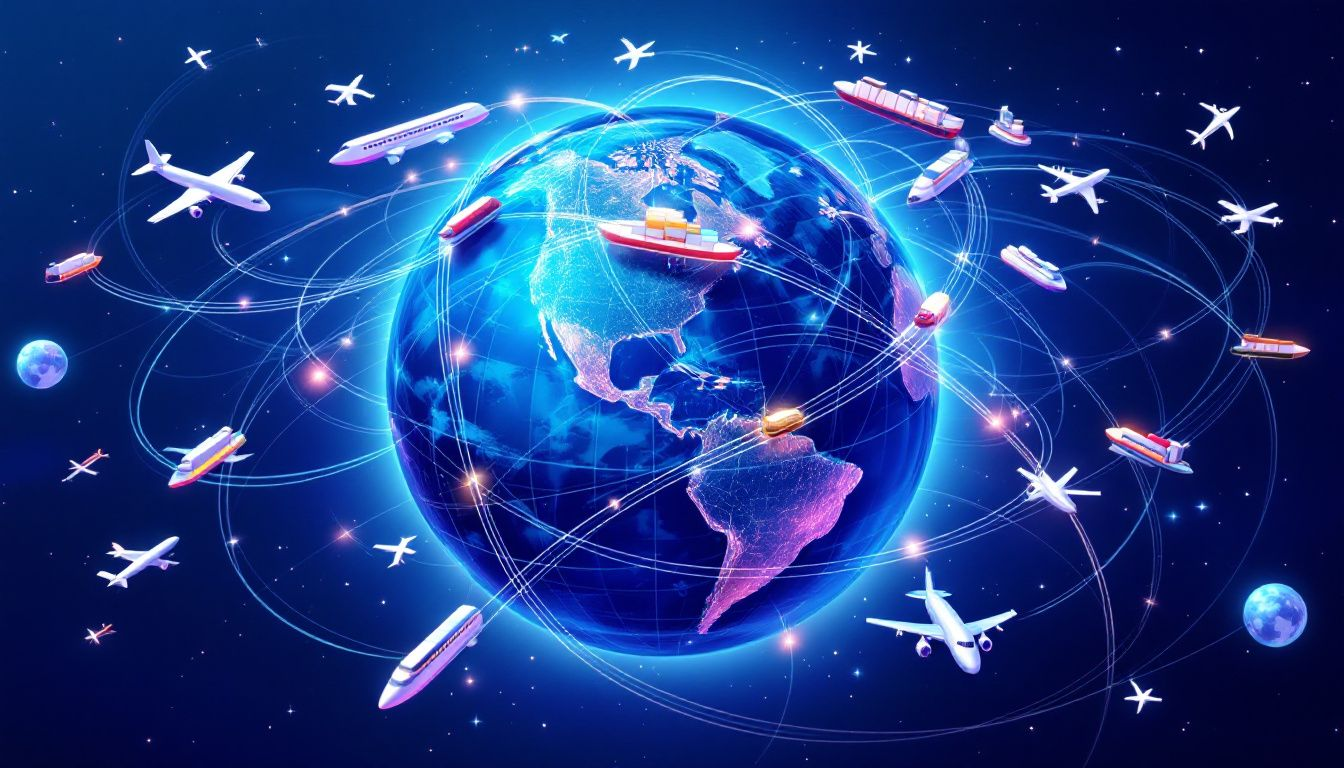International shipping involves various methods, cost factors, and reliability concerns. This article provides top solutions to manage these challenges and streamline your global shipments.
Key Takeaways
- International shipping is essential for global trade, with options like air freight for urgency and sea freight for cost-effectiveness.
- Effective management of shipping costs involves understanding factors such as weight, shipping speed, and utilizing shipping aggregators for discounted rates.
- Reliable delivery is enhanced through tracking options, which build customer trust and improve communication between all parties involved in the shipping process.
Understanding International Shipping Services

International shipping services are the backbone of global trade, enabling businesses to reach customers far and wide. Companies like FedEx and DHL Express are pioneers in this field, offering time-critical logistics solutions that are essential for businesses looking to expand their market reach. Whether you’re a small business or a large enterprise, understanding the various shipping methods available, including international express shipping, can help you optimize last and first mile delivery and manage costs effectively.
One of the key aspects of international shipping is choosing the right method for your needs. Air freight is ideal for urgent deliveries, providing fast and reliable service, while sea freight is more suited for larger volumes of goods, offering cost-effective solutions for less time-sensitive shipments. Additionally, multi-modal shipping, which combines air and sea freight, can optimize both cost and delivery time for all types of warehouses, providing a balanced solution for businesses.
DHL also offers flexible e-commerce fulfillment services that are globally standardized and designed to accommodate varying demand levels. Their distribution centers support both business-to-business and business-to-consumer operations, integrating advanced technology to improve process efficiencies. DHL ensures their logistics operations are both efficient and sustainable by prioritizing environmentally responsible practices.
Tips for International Shipping
Shipping internationally can be complex, but with the right strategies, businesses can streamline their operations and enhance customer satisfaction. Here are some valuable tips to consider:
Understand International Shipping Regulations
Before shipping internationally, familiarize yourself with the regulations of the destination country. Each country has specific import restrictions and documentation requirements that must be adhered to for smooth customs clearance.
Choose the Right Shipping Method
Select the appropriate shipping method based on the urgency, size, and nature of your shipment. Air freight is suitable for urgent and smaller packages, while sea freight is ideal for larger, less time-sensitive shipments.
Optimize Packaging
Proper packaging is crucial to protect your goods during transit. Use sturdy materials and consider the nature of your products to prevent damage. Efficient packaging can also reduce shipping costs by minimizing weight and volume.
Leverage Technology for Tracking
Utilize advanced tracking technologies to keep your customers informed about their shipment status. Providing real-time updates builds trust and enhances the overall customer experience.
Calculate Shipping Costs Accurately
Understand the factors affecting shipping costs, including weight, dimensions, and destination. Use shipping calculators to estimate expenses and consider consolidating shipments to save on costs.
Work with Reliable Courier Partners
Partner with reputable international courier services like FedEx or DHL to ensure reliable and timely delivery. Their extensive networks and expertise can help navigate the complexities of international shipping.
Plan for Customs Clearance
Prepare all necessary documentation in advance to avoid delays at customs. This includes invoices, SLA, packing lists, and any required certificates or licenses.
Consider Insurance for Valuable Shipments
For high-value items, consider obtaining shipping insurance to protect against loss or damage during transit. This adds an extra layer of security and peace of mind.
By implementing these tips, businesses can optimize their international shipping processes, reduce costs, and improve customer satisfaction.
Key Benefits of International Parcel Delivery
The benefits of international parcel delivery extend far beyond simply getting your products from point A to point B. Quick and reliable parcel shipping options enhance customer satisfaction and foster loyalty for e-commerce businesses. Joining a global network allows businesses to offer quicker and more economical shipping options for parcels, significantly enhancing customer satisfaction.
Moreover, using international delivery services allows businesses to tap into new markets, thereby increasing potential sales. Confidence in tracking services further boosts customer loyalty, as it provides transparency and peace of mind.
Additionally, global networks can mitigate risks from unexpected disruptions, ensuring continuity in shipping even during challenging times.
Cost-Effective International Shipping Solutions

Managing shipping costs effectively is crucial for any business looking to expand internationally. Several factors influence international shipping costs, including weight, dimensions, shipping speed, and destination. Many courier companies offer competitive pricing, helping businesses manage their shipping expenditures effectively.
One effective strategy is to use shipping aggregators, which provide access to discounted rates by combining shipments from multiple businesses. Consolidating multiple packages into one shipment can also help reduce overall shipping costs. Additionally, some international shipping services offer subscription models that grant discounts on shipping rates, further aiding in cost management.
Import duties and taxes are another significant aspect of international shipping costs. These are typically assessed based on the value of the goods along with their nature and characteristics. Understanding these duties and how they are calculated can help businesses better manage their shipping budgets. Preferential tariff treatment may apply for goods from specific countries, allowing for reduced import duties under certain conditions.
Furthermore, sea freight tends to have a lower carbon footprint per unit of cargo compared to air freight, making it not only a cost-effective but also an environmentally friendly option for larger shipments.
Ensuring Reliable Delivery with Tracking Options
In today’s fast-paced world, reliability in delivery is paramount. Tracking options provide full transparency and reliability, which are crucial for the successful delivery of international shipments. Emerging technologies like real-time tracking and automated delivery systems are transforming global shipping logistics, offering businesses and customers alike unprecedented visibility and control.
Real-time tracking features offered by international courier services build customer trust by allowing visibility of the shipment status. This fosters clear communication between sellers, courier services, and customers, which is vital for smooth business operations. Moreover, tracking reduces the frequency of lost packages, providing both sellers and buyers with peace of mind.
Navigating Customs Clearance for International Shipments

Navigating customs clearance can be one of the most challenging aspects of international shipping. Customs authorities play a critical role in inspecting shipments and ensuring compliance with local regulations. Proper documentation, including invoices, packing lists, and customs declarations, is crucial for international shipping.
Ensuring the accuracy and completeness of the customs declaration can significantly improve the timeliness of customs clearance. An Economic Operators’ Registration and Identification (EORI) number is necessary for a trade customs declaration, highlighting the importance of adhering to specific guidelines regarding compliance with customs regulations to avoid any legal issues.
Tailored Solutions for E-Commerce Businesses
E-commerce businesses often face unique challenges in international shipping. International courier services can customize shipping solutions to accommodate unique product requirements, such as fragile items that need to be shipped. Utilizing local print-on-demand platforms can significantly lower shipping costs and delivery times by producing goods closer to international customers.
Online shoppers prioritize tracking as a crucial feature for a seamless purchasing experience, leading platforms like Amazon to advocate for tracking information in confirmation emails. E-commerce retailers often require specialized international for example carbon neutral shipping solutions to optimize their global operations.
Shipping Dangerous Goods Internationally
Shipping dangerous goods internationally requires adherence to stringent regulations to ensure safety and compliance. The IATA Dangerous Goods Regulations (DGR) manual is essential for ensuring the safe and efficient transport of hazardous materials by air. Annual updates to the DGR reflect changes in regulations and procedures, helping prevent delays and penalties.
Dangerous goods are categorized based on their hazards, including explosives, flammable substances, and toxic materials, each requiring unique handling procedures. Air freight has stricter regulations for transporting hazardous materials compared to sea freight, necessitating careful planning and compliance.
Air Freight vs. Sea Freight: Choosing the Best Option

Choosing between air freight and sea freight depends on several factors, including the urgency, cost, and type of shipment. Air freight is the fastest shipping method, ensuring delivery in hours to days, making it ideal for time-sensitive shipments. However, it incurs a higher cost, often based on weight and volume.
Sea freight is more cost-effective for larger shipments, especially as shipment size increases. Selecting the right shipping carrier based on reliability and speed can influence overall shipping efficiency, stock control and costs. A ship can play a crucial role in this process if you sell supplements or if sell toys online.
Importing Made Easy
Importing goods can be a straightforward process with the right knowledge and preparation. Import taxes are typically applied to non-commercial consignments over 45 euros and all commercial consignments. A flat-rate duty can be applied to non-commercial imports if certain conditions are met, such as the value being below 700 euros.
Accurate documentation, including invoices and customs declarations, is essential to support the customs value at the time of import. Before importing, it’s crucial to verify if your product aligns with domestic market demand and if your company has the necessary resources and strategy.
Expert Support for Unique Shipments
Expert support is invaluable for shipping unique or valuable items. MBE provides time-consuming preparation assistance for export documents and offers SafeValue and SafeValue Art services specifically for sensitive and valuable items. Examples of valuable items include a racing bike, an antique sculpture, and valuable wine shipments.
Partnering with logistics companies that have TAPA certification ensures adherence to high security standards for transporting valuable items.
Leveraging a Global Network for Seamless Shipping

Leveraging a global network is crucial for seamless international shipping. Local expertise ensures products reach global markets with ease and efficiency. This expertise allows for smoother logistics and a better understanding of local regulations.
In Europe, 44% of business revenue comes from international trade, highlighting the significance of utilizing a global network to enhance the efficiency and reliability of shipments across borders.
Steps to Become a Global Player
Becoming a global player requires strategic planning and leveraging existing logistics networks. Being part of a global shipping network can enhance market reach by tapping into established logistics routes and partnerships. Access to a network of logistics experts enables businesses to navigate the complexities of entering new markets effectively.
Outsourcing logistics can enhance efficiency and reduce operational burdens, allowing businesses to focus on core activities. Adaptability in shipping strategies is crucial for managing potential disruptions in supply chains. Setting clear agreements on shipping costs and responsibilities can prevent unexpected expenses and delays.
Summary
In conclusion, understanding and implementing effective international shipping solutions can transform your business operations, ensuring your products reach customers worldwide efficiently. From leveraging global networks to navigating customs clearance and choosing the right shipping method, these strategies can help you overcome the challenges of international shipping and achieve global success.
Frequently Asked Questions
How to ship internationally from Germany?
To ship internationally from Germany, utilizing WAPI is highly recommended as they provide reliable solutions for parcels to over all EU countries.
What is the meaning of shipping worldwide?
Shipping worldwide refers to the process of transporting goods across international borders using various modes of transport, while adhering to the necessary regulations and procedures involved in international trade. It signifies the global exchange of products, facilitating commerce and connectivity between nations.
What are the main benefits of international parcel delivery?
International parcel delivery enhances customer satisfaction and enables access to new markets while providing tracking services and mitigating risks.
How can businesses manage international shipping costs effectively?
Businesses can effectively manage international shipping costs by utilizing shipping aggregators, consolidating shipments, subscribing to discount models, and gaining a thorough understanding of import duties. These strategies will help optimize expenses and improve overall logistical efficiency.
Why is tracking important in international shipping?
Tracking is essential in international shipping as it offers transparency and builds trust, ultimately reducing the likelihood of lost packages and optimizing fulfillment processes. This ensures a more reliable and efficient shipment experience for all parties involved.



 Community
Community
